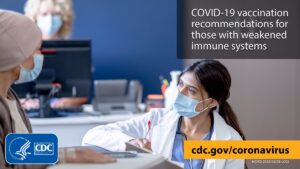COVID-19
Make an Appointment for NYC-Run Vaccine Clinic
 Getting Care After the COVID-19
Getting Care After the COVID-19
Public Health Emergency
COVID-19 is still around and poses a threat to the health of New Yorkers. Even though the Federal Public Health Emergency ended on May 11, COVID-19 testing, treatment and vaccination will remain available for New Yorkers. This includes people who do not have insurance or the ability to pay.
Everyone should stay up to date on COVID-19 vaccinations, get tested if they have symptoms or have been exposed, and wear a high-quality mask when sick, following an exposure and when COVID-19 levels increase.
Vaccines
Everyone should have at least one COVID-19 bivalent vaccine dose. For now, COVID-19 vaccines remain free.
- To find a vaccine, visit the NYC Vaccine Finder
- Learn more about COVID-19 vaccines.
Testing
Laboratory and self-testing remain low to no cost at City-run locations. Private insurance may no longer reimburse you when you purchase at-home test kits.
- COVID-19 Express Testing locations remain open.
- Free at-home rapid test kits will be available for pickup at sites across NYC, while supplies last.
Treatment
For now, the oral antiviral medicines, including Paxlovid remains free.
- Find a location on the COVID-19 Test to Treat Locator or call 212-COVID-19.
- NYC Health + Hospitals ExpressCare will continue to prescribe for free. Other types of treatment are available at low to no cost at Health + Hospitals sites.
Long COVID
Help with long COVID will remain available. If you think you have long COVID, talk to your provider or visit a Post-COVID Care Clinic:
For all questions regarding COVID-19 testing, results, quarantine, paid leave, long COVID or to speak to a nurse about symptoms, call 212-COVID-19 (212-268-4319).
We can all work to reduce the spread of COVID-19 by staying informed and taking the necessary steps in prevention. Learn more in the pages below about what you can do for yourself, your family and your community.
Masking and COVID-19 Transmission
Masks are still effective tools to reduce the risk of spreading or being exposed to COVID-19 and other respiratory viruses. Masks protect you and others by reducing the amount of droplets that enter the air when someone coughs, sneezes, talks, sings or breathes.
Our recommendations on when most people should wear a mask change based on the level of COVID-19 spreading in the community. Currently, we are at a low level of COVID-19 community transmission.
To reduce your risk of getting COVID-19, consider still wearing a mask in crowded indoor public settings, such as on public transit, at large events, and when shopping in crowded stores.
- Consider wearing a mask if you are at high risk for severe COVID-19 or are around others who are.
- Always wear a mask if you're sick and unable to separate from others, and for 10 days after you have COVID-19.
- Always wear a mask for 10 days after being exposed to someone who has COVID-19.
- Wear a high-quality mask, such as a KN95, KF94 or N95, for the best protection from COVID-19.
Vaccination
- Vaccine Main Page: Find a vaccination site and learn about the vaccine’s benefits.

